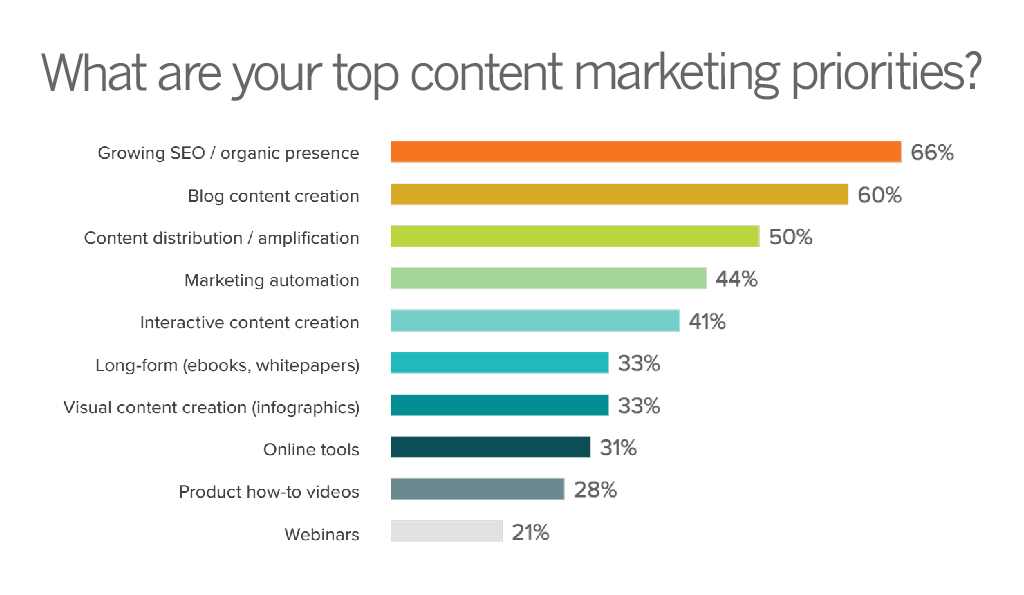In case you weren’t sure, writing matters a lot—especially for Content Marketing. In fact, it’s not unreasonable to claim that writing is the essential ingredient that gives content value. Yet today, most content marketing writing has plenty of room for improvement.
This could be the result of many things including:
- | Lack of a central focus—or even an idea
- | Awkward organization
- | Formal or too-serious voice
- | All about you
- | No reward for the reader
- | Poor craftsmanship and grammar
- | Not the right writer for the task
High demand for—and low supply of—good content marketing writing.
In recent research from over 4500 content marketers in over 132 countries, 74% identified their number one goal for creating content is generating leads. What’s more, over 66% identified writing for their organization’s blog as one of their top priorities.
But even more revealing is 40% of research respondents claimed that it’s now 2 to 3 times harder to get a response from a prospect on their content. And last, slightly less than half of the respondents cited hiring top talent for content creation as a big challenge.

So what’s all of this data mean? It’s reasonable to take away that good writing—and content—is not a commodity. In fact, data suggests there seems to be a low supply and high demand. So it may not be an overstatement to claim that without good writing, success with Content Marketing is at risk.
Which begs the question, how do you improve your content marketing writing to get it shared or acted on? Turning to a writing expert is a pretty good place to start.
A history of written word value.
Over the last 30 years, I’ve been fortunate to have worked with some very talented, award-winning writers in advertising agencies, technology companies, and communication consulting organizations. And I’ve also had some equally painful experiences of working with a few that never quite measured up to the qualifier of “good”.

Of those that have influenced, taught, and helped me improve my writing for marketing effectiveness, Eric Stouffer stands out as a model writer who can take challenging subject matter and turn it into an enjoyable reading experience that gets remembered, understood and acted on.
Eric recently shared some of the tenants that guide his writing and influence how he evaluates the quality of what he writes. If you’re a content marketer with writing responsibilities, consider evaluating what you produce against each of the attributes Eric cites below. It could help you figure out if your writing has room for improvement.
Are you challenged with writing about complicated content—beyond technical or nerdy? I feel for you but if you can’t hold a reader’s attention beyond paragraph one, no one is ever going to get through a sea of uninspiring data points to get to your call to action. This includes the chances of them sharing your content with anyone else.
The best way to make others want to read what you write is to listen carefully to the voice in your head speaking every word of your text. That means it better be conversational, authentic, and genuinely sound like you. A boring English grammarian just focused on the correct past participle tense probably won’t engage your reader. What you hear should become a filter for you to remove anything that adds unwanted friction in the expression of the point that you want to make.
Make no mistake, reading takes effort. So if someone invests the time to actually read what you’ve written, there better be something in it for them.
Whether it’s insight, understanding, a laugh, a checklist of do’s and don’ts, or what to do next, give them something they didn’t have before they made the investment to read your stuff. In today’s world of content saturation and overload, no reward after reading means that the reader isn’t going to go down the storytelling road with you again any time soon.
Features are nice. But benefits incite imagination and action. So paint a picture of success, take your reader to a place or perspective they haven’t been to before and help them understand an enhanced outcome through your writing. Let the reader see themselves in the destination that you would like to take them to.
Specs, details, and instructions all require much more reading effort than many are willing to invest. So when you answer WHAT’S IN IT FOR ME? people don’t check out, they stay engaged long enough for you to deliver your benefit.
You need to boil your primary point and benefit into a short, crisp and clear expression called a headline.
Ad legend David Olgivy understood that people read headlines first. And if the headline doesn’t grab reader attention or interest, chances are good that they’ll never get to the longer form copy that you want them to read. Make no mistake, writing headlines is not always compliant with great grammar or academic sentence structure. Headlines need to be challenging, action-oriented, and conversational for them to get noticed and read.
Your content is the most important writing that anyone will ever see on the web, right?
Wrong. By taking yourself or your content too seriously, you will accomplish exactly what you don’t want with your writing—putting your reader to sleep. Or worse, forcing them to stop reading because you’re droning on and on without any recognition of your reader’s unique challenge or perspective.
Getting people to see themselves in a humorous situation is one of the most effective ways to break the ice and start a conversation—for just about anything. And by using the authenticity and insight that you provide with humor, it sets up the credibility of the rest of your content.
If you’re immune to this essential trait, it’s hard to imagine how you will ever be a credible writer or content creator. The web is so pervasive with BS, it’s mind numbing.
How many times have you read, “We’re the best” “We’re a leader” or “Our clients love us”? No one is going to buy your claim—or read your content—unless you’re able to substantiate what you write in a way that an uninformed outsider can’t challenge beyond a reasonable doubt. So don’t make it up, back it up with the hard work of research, data, and supportive sources.
If you ever think someone will grant you the benefit of the doubt that your content should be taken at face value, it’s time to revisit that expectation.
It’s easy to fall victim to this keyboard character. But if your hope is added emphasis, it might actually mean that your content never gets read online. Especially if you attempt this faux pax in an email subject line.
That’s because it’s a virtual guarantee that SPAM prevention software will never deliver your content to your reader’s inbox. The result is your writing effort, and the use of unnecessary punctuation was a big waste of time.
Once again, your best guide for evaluating what’s important is to answer the question, WHAT’S IN IT FOR ME? If what you write doesn’t satisfactorily answer this, it goes overboard. And if you’re forced to add more detail than you’re comfortable with, put it in a bulleted list.
That’s right. Writing is structure and just like good visual design, it’s rare that someone nails the perfect written solution on the first draft.
Whether it’s an introduction, an ending, or an unconventional point of view, writing often takes much more time and effort than you planned to get to something that’s good.
That means a first draft is just that. Step away from it and return with a fresh point of view that helps simplify your expression and improve what you really want to say to your readers.
People love to read. The challenge is they’re too often forced to read unimaginative, poorly constructed and truly boring writing that does nothing to create a memorable experience or further an interesting idea. So forget former president #45’s pathetic message: “They’re just words people”.
Words matter more than ever. And it takes real work to make all of them great together—especially for Content Marketing.
Average is no longer good enough.
Online guru and professor Mark Schaefer has been quoted often with saying “The dirty little secret of Content Marketing is that you don’t have to be the best teacher to succeed. Just the first who overwhelms an audience with volume.”
That point of view is rapidly vanishing in the rearview mirror. Today, the focus for any content marketer should be improving what they create.
Good writing will make the difference between being passed over or acted on.
For a video script, an email subject line or a call to action in a blog post, it’s time to go beyond just stuffing your content with keywords and start improving your written content by measuring it against Eric’s quality attributes.
So get to work.
As president and creative director of TeamworksCom, Paul develops brand strategy, engineers content to express customer value and creates integrated online and content marketing solutions to help businesses succeed. Connect with Paul, send an Email, or just call 415.789.5830.

Thanks for the shout out, Paul. I’ve gathered these guidelines over the years and they’ve served me well professionally. My favorite is the notion that a writer is working even when they’re not writing. It’s a gathering of opinions and insights and cultural references that keep one’s writing feeling contemporary and relevant and still informative about the content being developed.
All great tips and insights Eric. Many thanks for the inspiration and for sharing your reflections on good writing. Hopefully, we’ll see more of it on the internet soon.
Superb guide! Most times people don’t consider the write up there use for content marketing.. It’s not just the message you’re sending out that matters most at all times, the writing must be captivating also to grab readers attention. Great tips. Thanks.
Thanks so much for your generous comment Oliver!
I’m blushing.
More than ever, good writing makes the difference between being passed over or acted on.
And the sooner that organizations recognize this value and stop focusing on churning out more crap from their content factories, the better experience we’ll all have online.
Absolutely we should have to keep all those aspects in mind while writing because the main purpose is to entertain the reader not just done with writing and content should be short but meaningful and purposeful.